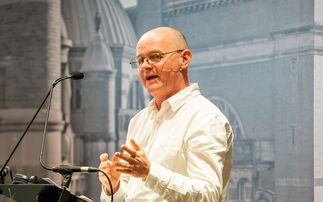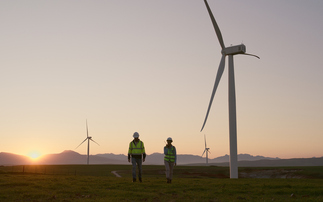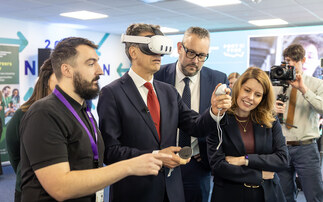BusinessGreen explores some smart strategies for taking on one of the most complex Sustainable Development Goals
1. Pay people properly
Not paying employees and workers properly undermines people's ability to feed their families, says Fiona Gooch, senior policy advisor at Traidcraft. It might sound obvious, but people can't eat if they are not paid enough to buy and cook food, and they can't work properly if they don't eat regular, nutritious meals.
If global hunger is to be eradicated in line with the targets for SDG2 then the debate around a 'living wage' needs to extend far beyond the industrialised economies and major cities where it has made some inroads and reach deep into global supply chains.
Although some companies are lauded for providing food at work, Gooch says this is not enough. She points out that in some places, such as India, this practice has been used as an excuse to pay workers less and the food they receive can be of very poor quality.
Moreover, even those involved in food production can face serious shortages. Alison Cairns of FReSH says a significant number of farmers go hungry for part of the year even though they are producing the food. "It's simply not right that they aren't seen as an immediate priority," she says. "We feel that there's an obligation that businesses should do their part within their value chains and across their sector to address hunger and nutrition among the people actually producing their food."
Paying direct employees a living wage and putting pressure on suppliers to do the same is arguably one of the most significant direct contributions a company can make towards SDG2.
2. Understand the trade offs
Cairns says wide-ranging reform of the food and agriculture sector has to be done in a way that avoids negative consequences. "You have to think of these issues systemically," she warns. "So yes there's a focus on world hunger and nutrition and that's great. But you also need to think about how not to impact the environment. If you do one or the other you'll create problems, so it's about how to create business opportunities within these constraints."
To this end, FReSH is soon to launch a Food Loss and Waste Value Calculator that allows companies to estimate the value of food loss and waste in terms of the nutrition being lost and environmental impacts. The idea, says Cairns, is to help businesses and others develop "more effective interventions" that understand the many environmental trade-offs that are baked into the food supply chain.
3. Work together
There is growing realisation that SDG2 is not a goal that can be achieved by individual companies, whatever their size.
Megan DeYoung, business development and sustainability consultant, recommends that larger businesses partner with smaller firms that she describes as "disruptors", in order to bring fresh thinking and innovation into the heart of the company.
"There are many newer companies focused on new farming techniques, plant-based proteins and genetics that are disrupting the food chain with technology and products that will help achieve SDG 2," she explains. "These disruptors understand the complexity of the food and agriculture system and are developing solutions to simultaneously address hunger, food security, nutrition and sustainable agriculture."
The disruptors, meanwhile, should partner with each other "to keep innovative ideas flowing" and with larger companies to scale up their innovations to have a much greater business and social impact, says DeYoung.
4. Engage your procurement team
Don't assume that just because you don't specialise in food that you don't have a role; every company has an indirect influence on the food supply chain.
Paul Newnham, coordinator of the SDG2 Advocacy Hub, says many large employers can have a significant impact. "For example people think of Ikea as a furniture company but they feed millions of people in their restaurants," he says. "So the kind of food they're feeding people and whether it's good for the environment is important."
Big companies can have a big impact and set an example for others with how they feed employees in their staff canteens, says Newnham. Google, for example, has been working on a World Resources Institute initiative called Better Buying Lab to develop tasty vegetarian meal options to tempt staff away from meat at its in-house canteen, lowering emissions in the process.
Newnham notes that, even if a large company has high-level sustainability goals, its food decisions are usually made by its procurement department based purely on cost. "Procurement is often given the wrong metrics to make these decisions," he warns. "Food is often seen as a commodity which means decisions are based on affordability rather than health and sustainability. You have to have real intentionality, you have to build in these sustainability issues."
5. Remember that food is more than just sustenance
Cairns of FReSH says there has been a focus for a long time on a very production-led food system, as opposed to what the consumer is actually eating and the impact on their wellbeing.
Newnham agrees. "Often in this space we look at agriculture and nutrition and it has been about how to increase productivity, make it more environmentally friendly, etc - it stops at the buyer," he says. "But food is not just about fuel; it's about culture, flavour and taste."
One of the SDG2 Advocacy Hub's projects is called Chefs' Manifesto, which engages well-known chefs around the world to contribute to the conversation around hunger and recognise the importance of food in people's daily lives.
Newnham says chefs can be powerful advocates for better food systems, inspiring people to act differently in their kitchens and communities and empowering them to call on governments and companies to play their part. Celebrity chefs are certainly known to have a significant effect on consumer buying habits; UK supermarkets have long acknowledged the 'Delia Smith effect', where products or ingredients used on a television cookery programme one evening lead to huge sales the next day.
Newnham says chefs can bridge the gap between the farm and the fork. "In doing so, they influence what we grow, what we put on our plates and how we think and talk about food," he says.








